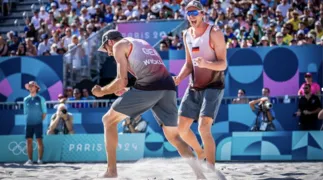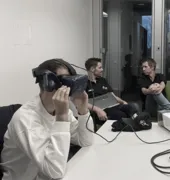What a great success for the beach volleyball duo Nils Ehler and Clemens Wickler. Cheered on by around 13,000 fans in the shadow of the brightly lit Eiffel Tower, the two German Olympians lost the final against the favored world number one David Ahman and Jonatan Hellvig from Sweden 0:2 in sets, but return from the Olympic Games in Paris 2024 with the silver medal.
The fact that winning medals is also thanks to the "team behind the team" has been confirmed by athletes in various interviews over the years. The Chair of Performance Analysis and Sports Informatics has also played a part in the success of the Olympics. The opponent analysis and anticipation training software tools were designed and developed at TUM and the Department Health and Sport Sciences.
"The cooperation between the German Volleyball Association and the Technical University of Munich has existed for 15 years and has been extremely successful," explains Prof. Dr. Daniel Link, who leads the scientific projects in beach volleyball. To analyze their opponents, the German teams use analysis software that was already used for Brink/Reckermann's Olympic victories at the 2012 Olympic Games in London and the women's team of Ludwig/Walkenhorst who won the gold medal in Rio de Janeiro in 2016. The software can help identify peculiarities in opponent behavior based on various match data. For example, it can show when athletes show certain action tendencies after mistakes.
The latest cooperation project carried out to the Olympic Games in Paris, specifically aimed to improve the anticipation performance of German beach volleyball athletes. "In beach volleyball, it is crucial for defensive players to recognize as early as possible in which direction an attacking shot is being played and to react accordingly," explains Fabian Tobias (MA), who works as “national coach: science” at the German Volleyball Association and is doing his doctorate on this topic at the Chair of Training Science and Sports Informatics. Using 3D glasses, eye tracking, and specific software, the observation and decision-making quality of the defensive players was examined and trained. "The study makes exciting contributions to expertise research and provides insights into the perception strategies of top athletes", Tobias continues.
Scientific cooperation between the Chair of Performance Analysis and Sports Informatics and the top German sports associations exists in volleyball and the German Badminton Association , the German Athletics Association, and numerous other sports. The sustained funding from the Federal Institute for Sports Science is proof of the important role that the Department Health and Sport Sciences plays in the Scientific Network for Competitive Sports. "We are constantly looking for innovations that can contribute to the improvement of sport," explains Prof. Link. "In addition to gaining scientific knowledge, we also want to make a contribution to maintaining the competitiveness of Germany as a top-class sporting location." In terms of beach volleyball, this was impressively achieved in Paris.
To the homepage of the Chair of Performance Analysis and Sports Informatics
Contact:
Prof. Dr. Daniel Link
Chair of Performance Analysis and Sports Informatics
Munich Data Science Institute
Georg-Brauchle-Ring 60/62
80992 Munich
Phone: 089 289 24498
E-Mail: Daniel.Link(at)tum.de
Fabian Tobias
German Volleyball Association (TUM)
National coach: science
Technical University of Munich
Research Associate
E-Mail: tobias(at)volleyball-verband.de
Text: Bastian Daneyko
Photos: Deutscher Volleyball Verband/Volleyballworld

